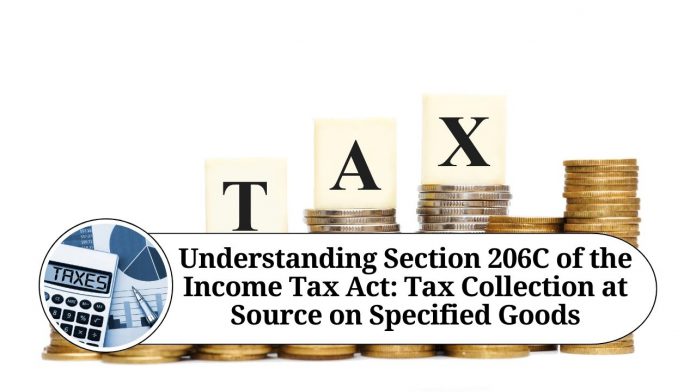Section 206C of the Income Tax Act, 1961 deals with the collection of tax at source on certain specified goods. It is a provision that requires the seller to collect tax at source from the buyer on certain specified goods.
The purpose of this provision is to ensure that tax is collected at the earliest point in the transaction chain, so that it can be deposited with the government and used for public welfare. This provision applies to specified goods such as timber, tendu leaves, scrap, minerals, and certain agricultural produce.
Under this section, the seller is required to collect tax at the rate of 1% from the buyer of these specified goods. However, the rate of tax may vary for different goods, and the government has the power to notify different rates from time to time.
It is important to note that this provision only applies to transactions above a certain threshold. The threshold limit for collection of tax at source under Section 206C is currently INR 50 lakhs in a financial year.
The seller is required to collect tax at source from the buyer at the time of receipt of payment or at the time of debiting the amount payable to the buyer, whichever is earlier. The tax collected at source must be deposited with the government within the prescribed time limit, failing which the seller may be liable to pay interest and penalty.
The buyer can claim credit for the tax collected at source while filing their income tax return. The seller is also required to issue a certificate to the buyer, indicating the amount of tax collected at source.
In conclusion
Section 206C of the Income Tax Act is an important provision that ensures timely collection of tax on specified goods. It is important for sellers to comply with the provisions of this section to avoid any penalties or interest. Similarly, buyers should be aware of the tax collected at source, and claim credit for the same while filing their income tax returns.
Read more useful content:
- section 234e of income tax act
- section 286 of income tax act
- section 90a of income tax act
- section 40a(7) of income tax act
- section 226(3) of income tax act
- section 24 of income tax act
Frequently Asked Questions (FAQs)
Q. What is Section 206C of the Income Tax Act?
Section 206C of the Income Tax Act deals with the collection of tax at source on certain specified goods. It requires the seller to collect tax at source from the buyer on certain specified goods.
Q. Which goods are covered under Section 206C?
Section 206C covers specified goods such as timber, tendu leaves, scrap, minerals, and certain agricultural produce. The government has the power to notify different goods from time to time.
Q. What is the rate of tax collected at source under Section 206C?
The rate of tax collected at source under Section 206C is currently 1%. However, the rate may vary for different goods, and the government has the power to notify different rates from time to time.
Q. Is there a threshold limit for collection of tax at source under Section 206C?
Yes, there is a threshold limit for collection of tax at source under Section 206C. The threshold limit is currently INR 50 lakhs in a financial year.
Q. When is the seller required to collect tax at source under Section 206C?
The seller is required to collect tax at source from the buyer at the time of receipt of payment or at the time of debiting the amount payable to the buyer, whichever is earlier.
Q. What happens if the seller fails to deposit tax collected at source with the government?
If the seller fails to deposit tax collected at source with the government within the prescribed time limit, they may be liable to pay interest and penalty.
Q. Can the buyer claim credit for the tax collected at source?
Yes, the buyer can claim credit for the tax collected at source while filing their income tax return.
Q. Is the seller required to issue a certificate to the buyer for tax collected at source?
Yes, the seller is required to issue a certificate to the buyer, indicating the amount of tax collected at source.




















